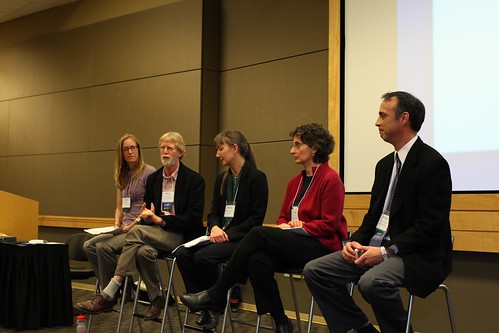Submitted by Sarah Mosely
Moderator Dr. Lisa Graumlich of the University of Washington’s College of the Environment led discussion with these well-informed panelists, practitioners affiliated with notable organizations – such as Seattle University, the Woodland Park Zoo, The Nature Conservancy, Water for Humans and Water 1st International – doing work to improve quality of and access to water, sanitation and conservation programs in communities throughout the developing world. Panelists discussed achieving sustainable and scalable results from their programs stems from a common set of activities: strong local partnerships; working with governments at the local level; gaining trust within the communities; and strengthening systems for monitoring, evaluation and communication, which is at the core of the work discussed. The panelists largely agreed that major challenges they all face include: a difficult economic environment; lack of sustained funding; chaos caused by redundant organizations working in the same areas; and first-world behaviors, namely consumerism. Overall, the panelists detailed their thoughtful approaches to program planning and implementation, and stressed that strong partnerships with local actors and government have been vital to success.
Panelists:
Kari Vigerstol, Hydrologist, Freshwater Program, The Nature Conservancy
Rick McKenney. Exec. Director, Water for Humans
Marla Smith-Nilson, Founder & Executive Director, Water 1st International
Lisa Dabek, Senior Conservation Scientist, Director of the Papua New Guinea Tree Kangaroo Conservation Program, The Woodland Park Zoo
Phillip Thompson, Engineers Without Borders and Associate Professor and Chair, Environmental and Civil Engineering, Seattle University
Moderator: Lisa J. Graumlich, Dean and Virginia Bloedel Professor, College of the Environment, The University of Washington
